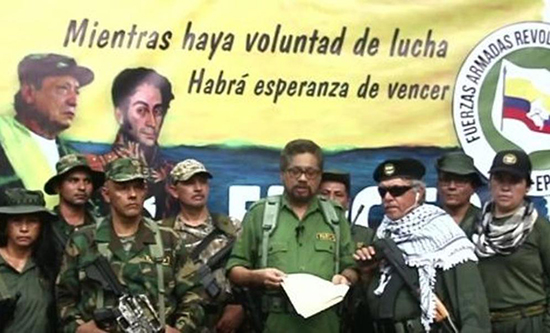
On 28 August, Ivan Marquez, lead negotiator for the Revolutionary Armed Forces of Colombia – People’s Army (FARC-EP) at the Havana peace negotiations from 2012, announced a return to arms against the government. In a two-hour video he explained that President Ivan Duque was responsible for the failure to achieve peace, with the continued assassinations of social movement leaders and ex-FARC-EP combatants who had surrendered their arms. The government responded with a bombardment of militant camps and the announcement of a $100,000 reward for information about the rebels. Alvaro Michaels reports.
Marquez’s declaration came only two weeks after ex-president Juan Santos launched a broadside in the press against Duque for obstructing peace, accusing him of trying to change the peace agreement, and failing to prevent the assassinations. Duque’s public response smugly stated that he would continue to use state violence: ‘We have chased the chief dissidents, this year many have fallen.’ FARC-EP, a communist guerrilla army, agreed to lay down its weapons in the 2016 Peace Accord. Instead its leaders formed a legal communist political party in – the Common Alternative Revolutionary Force (also FARC). Following continued state violence and the widespread breaching of the conditions of the Peace Accord by the government, FARC is splitting between those who want to continue this strategy and those who see the need to return to armed struggle.
Officials estimate that 300 fighters have joined Marquez, but there is no information about at least another 1,000 who left the official ‘reincorporation’ sites after the arrest of leading FARC member Jesus Santrich in April 2018 on bogus drug-trafficking charges. Marquez abandoned his seat in Congress and went into hiding that month citing assassinations against ex-FARC-EP members as the reason. Every 25 to 30 hours, a social movement leader or former insurgent is killed with impunity by members of paramilitary death squads or the Colombian Armed Forces. Around 40% of the victims of political killings are Afro-Colombians and indigenous people. Forced expulsions of rural communities continue unabated, with seven million now internally displaced. In the first four months of 2019 alone, at least 40,000 persons were displaced.
The ‘reincorporation’ sites still hold some 3,000 decommissioning FARC-EP members. A total of 1,700 known ex-FARC-EP members have retained their arms. Santrich who had earlier abandoned his government escort, appeared with 19 other FARC-EP leaders at the announcement of a return to guerrilla struggle. Among these were Henry Castellaños and ‘El Paisa’. In the Havana negotiations El Paisa had argued for the completion of the greater part of the Accord, for example the provision of land to ex-combatants, before surrendering arms – exactly as Fidel Castro had advised when he supported the negotiations. Marquez announced that FARC-EP would seek alliance with the 5,000 strong ELN (National Liberation Army). This is the other major guerrilla group in Colombia, which was excluded from the Havana dialogue by the government. The ELN has since participated in peace talks which have failed.
Marquez emphasised the reason for the return to hostilities was the betrayal of the Peace Accord by the government – ‘this exclusive and corrupt and violent mafia oligarchy’. 31% of the components of the Peace Accord have not even begun to be implemented. Overall, only 23% of the agreements have been fulfilled. The government had agreed to set up a fund with three million hectares to distribute to poor workers and campesinos, yet nothing has happened. It also agreed to give titles to formalise the ownership of ten million hectares. 55% of the Colombian countryside still has no titles, and this is the land that the bourgeoisie want to plunder.
The National Political Council of the FARC political party responded to the Márquez declaration, admitting that ‘fulfilment of the Accords on the part of the State marches at an elephantine pace’. However, ‘The Party … [does] not share in any of the ideas in the speech. The Peace Accords embody the culmination of the Colombian people’s old desire for an end to the armed conflict. … To proclaim the armed struggle in Colombia today constitutes a delirious mistake’. Rodrigo Londono, leader of the legalised FARC, says that 90% of former FARC-EP fighters continue to pursue legal means of changing the country.
FRFI has always understood that facing the political genocide conducted by the state, the rural poor have had either to engage in armed self-defence – which took the forms of struggle by FARC-EP, the ELN and others – or, on pain of death, be physically ejected from their homes and land by predators backed by imperialism. The struggle for true peace in Colombia has continuously been sought by FARC-EP, attempting to hold the state and its allied paramilitary organisations accountable. When the state ceases definitively its aggressive and murderous campaign against social leaders and ex-FARC–EP members, and fulfils its obligations under the Peace Accord, then those who have been forced to return to arms may then reconsider their position.




